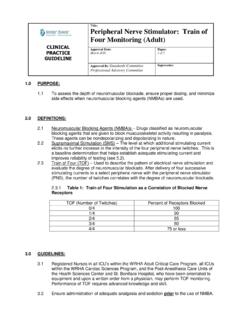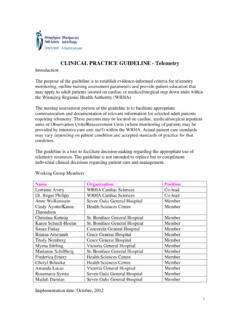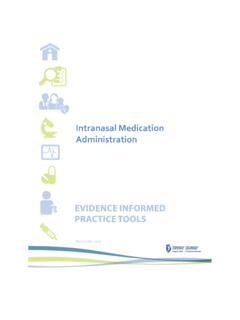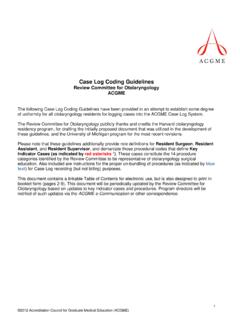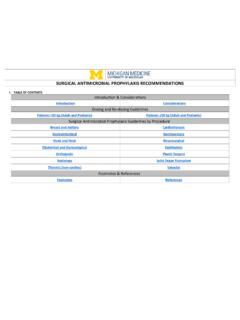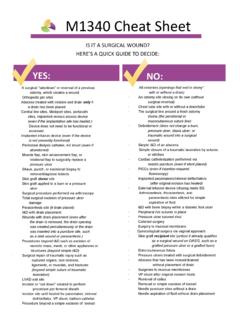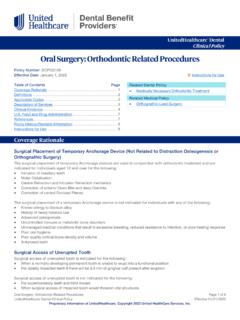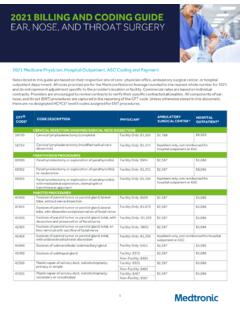Transcription of Routine Preoperative Lab Tests for Adult patients (age ≥ ...
1 Appendix A: Clinical Practice Guideline v1 Review date: December 2010 Routine Preoperative Lab Tests for Adult patients (age 16 years) Undergoing Elective surgery The grid does not apply to patients undergoing cardiac or cataract surgery . For cataract surgery , no Preoperative lab Tests are routinely indicated, but if the patient s condition has deteriorated within the last 6 months, submit lab test results obtained in addressing this deterioration. For patients with complex or uncommon surgical or medical conditions, Tests beyond what is suggested in this grid may be appropriate. Tests are valid for 6 months provided there has been no interim change in the patient's condition. Order all indicated Tests , based on the type of surgery , the Patient s Age, Exercise Tolerance, Medical Comorbidities and Drug Therapies CBC ECG Elec Cr and eGFR Glc INR PTT LFT CXR Iron Indices Age, surgery and Exercise Tolerance ( )
2 Minor surgery , age < 50, any No routinely indicated Tests if patient is otherwise healthy Minor surgery , age 50, 4 METs No routinely indicated Tests if patient is otherwise healthy Minor surgery , age 50, < 4 METs Major surgery , age < 50 Major surgery , age 50 Vascular surgery Medical Comorbidities Hypertension Cardiac disease, 4 METs Cardiac disease, < 4 METs Respiratory disease, 4 METs No routinely indicated Tests for this comorbidity Respiratory disease, < 4 METs Stroke/ TIA/ Peripheral Vascular Disease Renal disease Liver disease Diabetes mellitus BMI > 40 High risk for malnutrition Thyroid disease Also obtain TSH Malignancy (except basal cell ca.)
3 High risk for anemia High risk for iron deficiency Drug Therapies Diuretic, ACE inhibitor, or ARB Coumadin Oral Corticosteroids Digoxin Also obtain serum digoxin level Other Preoperative Tests with Specific Indications Sickle cell screen: With appropriate pre and post test counseling, Preoperative sickle cell screen should be offered to patients of high risk ethnicity unless it has been previously performed, in which case it should be documented. High risk ethnicity groups include: African, Caribbean, Saudi Arabia, Northern Greece, Southern Italy, Southern Turkey and South Central India. Antiepileptic drug (AED) levels: Should be obtained only for patients on Carbamazepine, Phenobarbital, Phenytoin, or Valproic acid who meet at least one of the following criteria: (1) a history of unstable AED levels, (2) a seizure within the last 6 months, or (3) undergoing major gastrointestinal surgery .
4 Appendix A: Clinical Practice Guideline v1 Review date: December 2010 Legend- Tests Elec Electrolytes (sodium, potassium, chloride and bicarbonate) Cr and eGFR Plasma Creatinine and if available, eGFR Glc Fasting plasma glucose LFT AST, ALT, Alk Phos, GGT, albumin, total and direct bilirubin CXR Chest X-Ray Iron indices Serum iron, TIBC and ferritin Legend- Patient Characteristics Major surgery Resection of organs (laparoscopic or open incision) in the neck, thorax, pelvis or abdomen, (except laparoscopic cholecystectomy); open vascular surgery (except varicose vein stripping); endovascular procedures; intracranial surgery , head and neck surgery for malignancy (except basal cell carcinoma), spine surgery (except for discectomy), major joint replacement or fusion, surgery involving free flap reconstruction, panniculectomy.
5 Minor surgery Defined by not meeting criteria for major surgery . Includes: eye surgery (except cataract removal), tonsillectomy, nasal septoplasty, breast surgery without free flap reconstruction, direct or laparoscopic inguinal or umbilical hernia repair, diagnostic laparoscopy, tubal ligation, laparoscopic cholecystectomy, uterine D and C, hysteroscopy, endometrial ablation, carpal tunnel repair, dupuytren s contracture release, basal cell ca resection with local reconstruction, arthroscopy, discectomy, endoscopic urology and electroconvulsive therapy (ECT). in METs Exercise tolerance in metabolic equivalents (METs), as reported by the patient 4 METs: Able to complete one or more of the following activities, or a more strenuous activity, without having chest pain or dyspnea: walk up a hill, run a short distance, or climb a flight of stairs.
6 < 4 METs: Has chest pain or dyspnea with 4 METs activities or is unable to complete them for any reason. Cardiac Disease MI, Angina, CHF, Valvular heart disease, Atrial fibrillation or other Arrythmia Renal Disease Gross proteinuria or elevated creatinine Liver Disease Includes jaundice, hepatitis, cirrhosis, hepatic metastases and ethanol abuse (defined as average intake > 2 standard drinks per day). High Risk for Includes BMI < 19, unintentional 10% body weight loss over previous 6 months, inflammatory Malnutrition bowel disease, oral, esophageal, gastric, and pancreatic malignancy. High Risk for Anemia Includes patients with a history of anemia, connective tissue disease ( lupus, rheumatoid arthritis), inflammatory bowel disease, menorrhagia, gross hematuria or gastrointestinal bleeding. High Risk for Iron Anemic patients with low MCV or high RDW on CBC.
7 Deficiency ARB Angiotensin receptor blocker Notes Preoperative pregnancy testing will be carried out by Preoperative staff using existing procedures. Preoperative type and screen and group and hold will be carried out by surgeons and preadmission clinic staff using existing procedures. There are no Routine indications for Preoperative pulmonary function Tests , spirometry or arterial blood gases. There are no Routine indications for Preoperative urinalysis, save for specific surgeries, at the surgeon s discretion. Preoperative histories and physicals are also valid for 6 months, provided there has been no interim change in the patient s condition.



